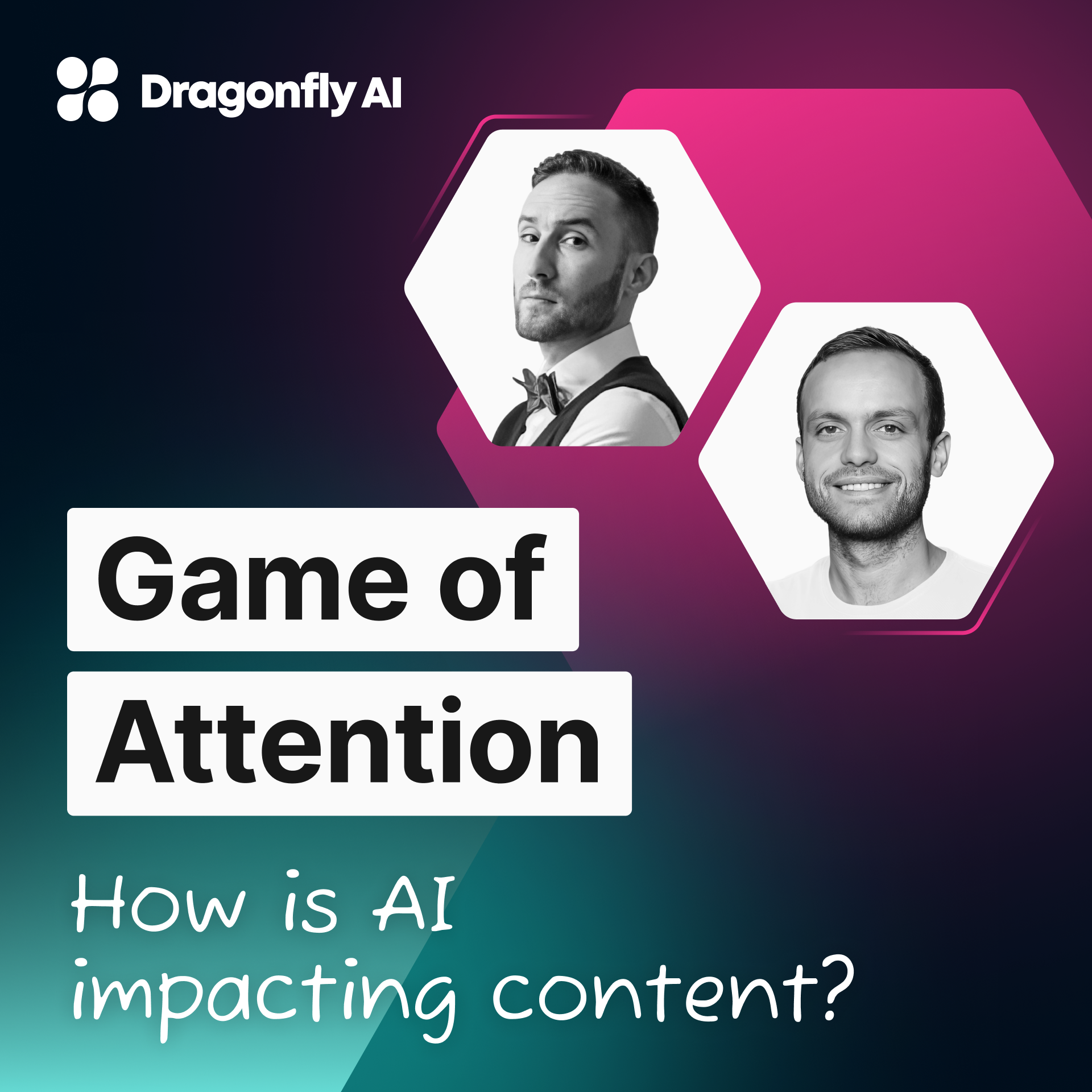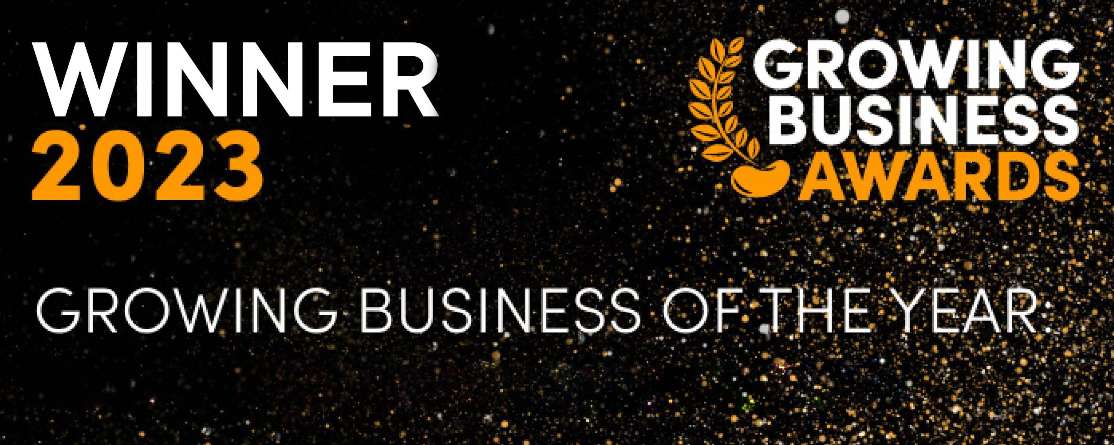Dragonfly AI is a predictive analytics platform designed to help you improve the quality and effectiveness of your creative across any format, channel and market.
How is AI Impacting Content?
Expert-led podcast discussing trending articles, and news in the AI and attention spaces.

Webcasts led by experts
How is AI Impacting Content?
AI and content.
The chatter is everywhere. What’s real, what isn’t, does it matter? How do brands stand out but still benefit from AI? And what on earth has SEO got to do with it?
To get into the nitty gritty of it all Game of Attention welcomed CEO of The Creative Copywriter, Konrad Sanders, and SEO expert, Andrew Cherrie.
Everyone knows there are multiple perspectives to this topic and today we’re considering what content looks like now and in the future thanks to AI.
Q: How can professionals balance the efficiency and scalability offered by generative AI with the need for high quality, authentic content?
Konrad: I think balance is a key word there. I often talk about balance in marketing. I think if you're building a content strategy and you're just focused on keywords and just the search engines, you're missing many tricks, which is the fact that we're actually trying to attract and engage humans and convince and convert. We've kept our ears to the ground when it's come to the developments in AI and LLMs and, you know, when GPT itself came out in 2020 and because naturally, it does pose a threat to our services or at least the perception of how it can be used.
I've seen like these two approaches on LinkedIn, people who like really for it and maybe going too far in that direction and like, Oh, we can just use AI and here's a simple prompt and it can generate all your content. Then there's those that are kind of the technophobes that are completely against it.
We don't believe that Chat GPT can just simply create great content. The way it works is that, you know, it's a predictive tool. It kind of works by choosing the most likely next word with some variability there that's likely, you know, based on what it's been trained on, billions of data points out there on the web and your prompt. It's prone to cliches because it's learned copywriting from the web, right? What's out there on the web is mostly cliched and average content and copy. So it's most likely to create average copy and content. And what it's likely to also do is miss, as you mentioned, that authenticity, that creativity, that human touch, which I think is gonna become more and more important.
Andrew: I think the two key words were balance and then authenticity. It would be very stupid and naive to just rule out using AI altogether in the processes that we have. I've already seen it to be very useful and very helpful in a lot of the things that I do, but it can never be overly relied upon to deliver things like authentic content because I just don't think it has the capacity to do so at the minute. Scary thought that one day an AI could be authentic and provide more value than a human being, which I don't think is beyond possibility.
But for me, my experience with seeing AI generated content, the written words itself has been very disappointing, not particularly useful. And the main thing for me is the authenticity. So the big thing with Google's helpful content updates over the last year, well, it's been a series of updates, but it's been all about additional value and adding things that don't already exist out there on the net.
AI can take things, it can rechurn it, but it's only gonna be rewording or repackaging what's already out there. And if what's already out there is not particularly good, it's not gonna deliver any extra value. So yeah, I think definitely moving towards that is recognizing that it can be very, very useful and very helpful for us, but never ever forgetting that human element, which in SEO is exactly what Google is going to be looking for.
Konrad: We've used search as it now stands and that's changing and we're obviously going to dive into that, how search is changing. But us as copywriters, as kind of content creators for our clients, you know, we do a lot of our research through search, which in some senses feels a bit antiquated now, doesn't it? Like typing in a term and having to filter through lots of articles written by companies that have had a good SEO budget to try and find.
Andrew: But it's also the most underrated, I think, and the most underused is actually just looking at things, you know, we can use a tool and it says the intent of this keyword is this, but actually you go and have a look at the results and it's clearly, you know, very wrong. So yeah, that, that for me is very underutilized skill in SEO actually.
Konrad: I personally use it, you know, even for creating LinkedIn content. I probably shouldn't be saying this, but you know, as a sparring partner, right? Like it's my idea. I have the ideas usually on a Saturday morning and for transcribing calls when we do customer interviews or stakeholder interviews with clients.
Beka: Yeah, I have to agree on most of them because obviously with content strategy that I do for Dragonfly, I'm running eight copywriters and to do the research and when I'm doing thought leadership pieces, it just cuts that kind of chunky stuff down so much.
But there has to be a balance. It still has to be at the center of it, human to human. I'm not going to put out anything out there that's in the ever evolving landscape of blah, blah, blah, blah, blah. There's enough of it out there. We don't need more of it. And I'd rather put out less higher quality than more
Andrew: Sometimes in SEO as well that ultimately it's not search engines that are reading what we're putting out and landing on what we're putting out, right? It's ultimately it's another human being with eyes and a working brain. And Google's ultimate goal in ranking something is to provide them with the best result, not something which satisfies dark algorithms that they have that, you know, SEOs have cracked the code of how to get into them. And, you know, it's all a big secret. And if you give Google what it wants, you'll rank. No, it's not. It's very much that if you provide another human being with something that's valuable and useful, you've very much increased your chances of ranking well on Google. So, yeah, definitely agree with that. And something that we all really do forget is that every single piece of content we put out, unless it's part of crap, and it never gets indexed, but most things will get read and seen by another human. And when we think about that, it makes it a bit more, well, we should make that as good as it can possibly be. It's not a rush job. It's not about efficiency. It's about making that really helpful for someone. So something we should try and always remember when we're developing content, I think.
Konrad: There's the other end in terms of SGE, right? And how the way people search is changing, especially Google, I know it's been rolling out in various places, but that's all going to change, isn't it?
I now use chat GPT to answer those more kind of top funnel, simple, basic questions that I used to use the current Google search for, which means that the way that I search for information has changed. In my opinion, when it comes to content marketing, that top funnel part is what will be affected most. So where does the company's budget go into? I think it's more into mid and bottom funnel content and copy.
Andrew: Yeah, the SGE, the sort of bad stuff and stuff like that's interesting because we've kind of been, there's been like a soft launch of that for quite a few years now, right? Well, even going back 10 years, I remember speaking to someone who had a website that would scrape weather forecast information, blah, blah, blah, and get a hell of a lot of traffic. And then sell the advertising space and the whole thing just collapsed when Google just started showing the snippet of the weather forecast.
Taking the clicks away is definitely going to be an issue coming forward. But I think Google is going to have to be very careful and very sensitive about this because then you disincentivize content creators. What's the point? You're essentially just feeding content into Google and saying you can have that for yourself and we don't see the benefit of that essentially.
I totally agree like the top funnel stuff where you just want an answer as quickly as possible. But the implied intent behind it that I want additional information beyond that, that maybe a chat bot or an AI might not be able to provide me. So, and again, that's a huge task for Google is trying to work out what are those queries that we can show those? What are those that we do need to show a traditional SERP, right? Where someone does want to click through on the result.
Konrad: If content creators stop creating content because there's no longer ROI for doing so, then it just becomes this black loop of just not learning anything.
Don't suddenly take all of your SEO budget and throw it into something else, because SEO is still really, really important and a brilliant way to kind of bring traffic and sales and revenue to a company, but start to think about perhaps how some of your content at least needs to be more value driven, more opinion based, more authentic.
I think that differentiation has always been a key part of marketing, a key crucial ingredient. And perhaps it's going to be even more important and back to authenticity, that's going to be even more important
Andrew: The game hasn't changed. Low quality content is still the enemy that we're fighting against, right? It's just that the, I guess the speed and the scale of AI in the past two or three years has probably just caught people off guard. I think it was always happening. It was always being used. I've seen AI produce content for six, seven years minimum. It's just, it's got a lot better, a lot quicker. So I think everyone was just a bit surprised by that, but still the same people were churning out low quality content 10, 15 years ago with, two cent a word copywriters outsourced from abroad and stuff like that. So it was always there. They were always pumping out huge amounts of bad content. Just, they do it a lot quicker and a lot easier now, I think.
Q: How can copywriters, SEO consultants and brands collaborate effectively to leverage GenAI and creating content that's both engaging and optimized for search engines?
Andrew: I don't think there's any consensus yet on how much we do use this or to what extent do we edit a piece of content, for example, that might have been produced using AI or at least the basic structure and outline of it was how far do we go with it? How far do we trust the AI? It's very much a work in progress.
I try and set those out quite soon on, you know, maybe taking on a new client or working with an in -house team, for example, an agency, trying to find out exactly what their processes are for using AI in the beginning, what mine are, and then trying to set those out in the beginning so everyone's clear on how we use it, how it forms part of our, you know, more manual human processes as well.
Konrad: You know, it's something that we aim to do with this prior to AI, right? Like having the right discussions with our clients to understand their goals, their needs, their, their capabilities.
When looking at content formats, which is one of our kind of mini workshops when we're discussing what kind of formats they can leverage, repurposing being, you know, a nice word that I like to talk about in content strategy, because it just makes a lot of sense to repurpose.
I think that repurposing is one where we're starting to see like a, perhaps a, what I would call a game changer for us as a, as an agency creating content because, you know, arguably you can kind of create some really valuable opinion based authentic content. Let's say a high value lead magnet, a report or something. And that's come not just from the web. It's not just come from AI.
Q: What are the like resistance or like specific concerns that your clients often express?
Konrad: It's interesting because, you know, we went through that period in like November 2022, was it? Where all of a sudden, and my wife, she's on TikTok a lot and there was suddenly like, you know, fear -mongering, the death of copywriting, the death of this.
We've occasionally had people saying, we're looking for human copywriting, literally like a request in through, the agency website saying, we're looking for human only copywriting. So that's obviously, I guess they've been burnt or they know that whatever circles they've been in that they've seen a lot of the kind of crappy cliches.
I can think of one instance specifically. This is one of our kind of enterprise companies where again, and I think I mentioned it before, there was someone who comes from more of a like scale up, SaaS scale up background growth hacker sort of person that was like, well, look, we can do this, just one individual but the marketers were kind of on our side going, because they saw the quality of it, right? coming back to it being a tool, there was this really good comment on one of my LinkedIn posts and I remember it almost word for word. They said, you know, the best way to write great copy, with AI is by being a great copywriter otherwise garbage in garbage out.
Andrew: I've seen both extremes as well. I've actually lost a client because they were convinced that they could do everything using AI. And I've then won a client who left their existing agency because of their overuse of AI and their insistence that everything was done that way. It was the marketing manager who made that call to leave the agency and inquired with me. And it was a sales director who made the call the other way, who said, let's do everything with AI.
Whatever mindset and approach you have in marketing is probably very much gonna influence your opinion and your approach to AI.
Q: The influx of AI -generated content. How do you think it's going to affect search engine algorithms and ranking strategies?
Andrew: Well, it's already affected it. So we've had the helpful content update, for example, over the last year that's been rolling out. Google hasn't said this is a response directly to AI, but it's pretty obvious that it is the scale of it. The wording of all the documentation is very clear that AI isn't necessarily the enemy, that the AI generated content is not banned per se, it's just that it has to be better than what's already out there to rank, which has always been the case anyway.
So the fundamentals of that have not changed. The algorithms are only really responding, I think, to the scale and the speed of how much content has been produced maybe since these tools have become free and more usable.
It's more important now for brands and the content producers to be more selective and be a bit more clever about the content they're putting out. Quality over quantity again, because it's just going to get lumped in with all of that AI produced content, which is like just SEO landfill at the minute. It's just filling up and you don't want to get lumped in with that.
What a set of insights about the impact of AI on content. Valuable for anyone working within creative on any scale, the answer to finding balance is identifying the best ways to make AI work for you without losing that all too important authenticity.
The article that triggered this great discussion is here.
Listen here.
And don’t forget to subscribe here.


